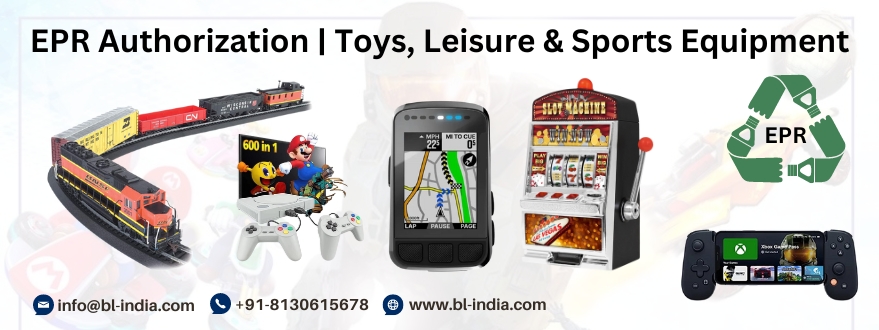
Toys, leisure items, and sports equipment play a significant role in enhancing our quality of life, providing entertainment, and promoting physical activity. From children's toys to camping gear and athletic gear, these products are integral to our daily routines and recreational pursuits.
However, with the proliferation of these products comes the responsibility to ensure their sustainability and safety throughout their lifecycle. To make sure this, the concept of Extended Producer Responsibility (EPR) Authorization emerges as a crucial framework for regulating the lifecycle of toys, leisure items, and sports equipment, ensuring their sustainability and safety.
This blog delves into the significance of EPR Authorization for these products and examines why it is required to safeguard both consumers and the environment.
Extended Producer Responsibility (EPR) Authorization for E-waste management is a regulatory framework that places the responsibility for the environmentally sound disposal and recycling of electronic products on the producers, importers, and brand owners. E-waste, which includes electronic devices such as smartphones, laptops, tablets, and other electrical appliances, presents significant environmental and health hazards if not managed properly.
EPR Authorization mandates that manufacturers and importers of certain electronic products take responsibility for the entire lifecycle of their products, from production to disposal. This entails designing products with considerations for recyclability and ease of disassembly, establishing collection and recycling programs, and ensuring compliance with environmental regulations and safety standards.
This authorization aims to shift the burden of E-waste management from municipalities and taxpayers to the producers, encouraging them to adopt sustainable practices and minimize the environmental footprint of their products. By holding producers accountable for the end-of-life management of electronic products, EPR authorization promotes resource conservation, reduces pollution, and contributes to the transition towards a circular economy where materials are reused, recycled, and recovered instead of being discarded as waste.
EPR Authorization is required for certain toys, leisure items, and sports equipment primarily to address the environmental and safety concerns associated with these products throughout their lifecycle.
These products often contain electronic components, batteries, or other materials that can pose risks to human health and the environment if not managed properly. EPR authorization ensures that producers take responsibility for the proper disposal, recycling, or treatment of these products at the end of their useful life, minimizing the release of hazardous substances into the environment.
Toys, leisure items, and sports equipment contribute to the generation of waste and resource depletion, both during their production and disposal phases. This authorization mandates producers to adopt sustainable practices, including the use of eco-friendly materials, energy-efficient manufacturing processes, and recyclable packaging, thereby reducing their environmental footprint.
By requiring producers to adhere to safety standards and regulations, EPR authorization helps mitigate potential hazards and risks associated with these products, safeguarding consumers from accidents, injuries, and health hazards.
Under E-waste management regulations, various types of toys, leisure items, and sports equipment require EPR certificates to ensure responsible end-of-life management. These include:
The significance of EPR authorization for toys, leisure, and sports equipment lies in its role in ensuring sustainability, safety, and responsible end-of-life management for these products. Here are some key points highlighting its importance:
Applying for an EPR registration certificate for E-waste involves several steps and requirements. Here's a general overview of the process:
Step 1: Gather all the required documents and information needed for the application process.
Step 2: Complete the application form provided by the regulatory authorities and submit it along with the required documentation.
Step 3: Depending on the jurisdiction, there may be fees associated with the application process.
Step 4: The regulatory authorities will review your application and evaluate whether your company and products meet the criteria for EPR registration.
Step 5: You may be required to undergo inspections or audits to verify compliance with the regulations and standards set forth by the regulatory authorities.
Step 6: If your application is approved and you meet all requirements, you will be issued an EPR registration certificate for E-waste management.
To obtain EPR Registration Certificate for E-waste Management, various documents are needed for the application process:
In conclusion, the mandatory requirement of EPR Authorization for toys, leisure, and sports equipment highlights the critical importance of responsible waste management and sustainability in today's consumer market.
At Brand Liaison, we recognize the significance of EPR authorization in ensuring the safety and environmental sustainability of these products. Our dedicated team assists companies in navigating the complex process of obtaining EPR registration certificates quickly and efficiently in India.
By leveraging our expertise and industry knowledge, we streamline the application process, facilitate compliance with regulatory requirements, and help brands uphold their environmental responsibilities while maintaining a competitive edge in the market.